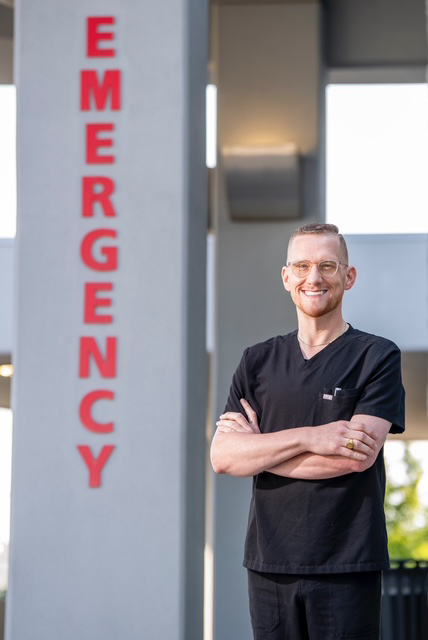
Everything Ryan Barrett does is driven by two principles: being able to provide safe patient care and protecting his nursing license.
And that starts with making sure that nurses have a voice.
“I'm tired of nurses constantly being given the crumbs at the table,” he says. “You know that if you don't have a seat at the table, you're on the menu. Nurses forever have not even been on the menu. But I want us to do something even bigger. We're not just pulling up a chair—we're building a bigger table. When everybody is heard and everybody has a seat, we turn over rocks that we probably wouldn't have turned over. I think that in another decade, or even sooner, that we can see a revitalization of health care in America.”
Barrett started his career as an emergency room technician when he was 15 years old. Since then, he has always worked in a position that allows him to take care of people.
He had intentions of going to medical school until life had other plans. However, that didn’t stop him from staying in patient care.
“I felt like I had platueaed in my role, but I wanted to stay in health care and eventually find some meaningful role in leadership—particularly advocacy efforts for the nursing profession,” he says.
Barrett enrolled at Madisonville Community College, where he earned two associate degrees: one in nursing and the other in applied science.
When Barrett was looking to take the next step, joining Northern Kentucky University’s RN to BSN program was an easy choice.
“Seeing the culture that surrounds NKU’s nursing program, it was a no-brainer for me,” he says. “It offered me the flexibility I needed, and there’s support from the top down. They have your back, and I will tell you—it's a night-and-day difference from what I experienced in my ADN program. I can't think of another program that would go through those efforts to make sure that you're going to succeed.”
Barrett, who works as a registered nurse in St. Joseph Hospital’s Emergency Department in Lexington, Kentucky, is also minoring in health care policy and ethics.
His passion for nursing and advocacy led him to become the president of the Kentucky Association of Nursing Students (KANS) from 2023-2025. Earlier this year, he was named the national president of National Student Nurses’ Association (NSNA) for 2025-26.
Barrett’s vision for the nursing field comes at a time when not only the nation but the Commonwealth is facing a nursing shortage.
“We're at a breaking point,” he says. “In Kentucky alone, the governor said that we need 23,000 nurses today—not in five years, not in 10 years. We need that many nurses right now just to meet the needs of Kentuckians.”
Barret’s leadership hasn’t gone unnoticed.
He was designated the title of Kentucky Colonel for his work as KANS president and received the NSNA DAISY Award for Extraordinary Student Leader.
He was also recently invited to join the Healthy Workforce Environment Coalition, which is a group of leaders from across the country who are coming together to ensure safe work environments for nurses in the wake of the workforce shortage.
Barrett, who will graduate in May 2026, is always looking ahead. No matter where he ends up, he’s not worried about collecting titles but rather advocating for those in the nursing profession.
“I don't want us to just create another module. I don't want us to just create another piece of paper that really doesn't do anything. We can't just say we want the profession to be better. We actually have to do something to make it better,” he says. “For me, this degree is just another step in ensuring that we're doing everything that we can to protect our patients and protect our license. I know that I want to continue in my learning to get my master's and my doctorate. I don't know exactly which path I'm going to take, but I think that my role is somewhere in advocacy. I don't ever want to take on a position that is just going to push papers and put on band-aids. I want to find an organization that really wants to put the work in and find a role in their advocacy efforts.”

Editor, NKU in View
Assistant Director, University Communications